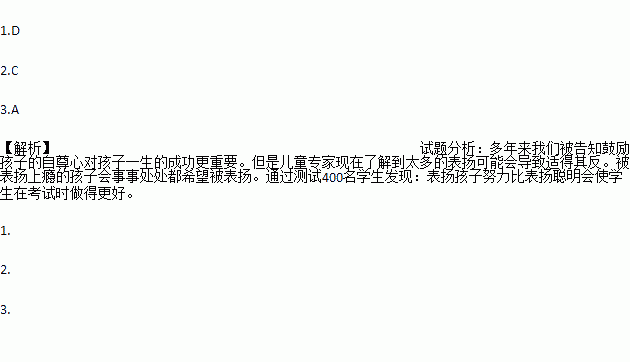题目内容
The implication(含义) of saying “You are the prettiest girl in class,” or talking about the goals she scored but not her overall effort, is that you love her only when she looks the best, scores the highest, achieves the most. And this carries over to the classroom.
Social psychologist Carol Dweck, PHD, tested the effects of over-praise on 400 fifth graders while she was at Columbia University. She found that kids praised for “trying hard” did better on tests and were more likely to take on difficult assignments than those praised for being “smart”.
“Praising attributes(品质) or abilities makes a false promise that success will come to you because you have that quality, and it devalues effort, so children are afraid to take on challenges,” says Dweck, now at Stanford University, “They figure they’d better quit while they’re ahead.”
1.
A. tired of being praised B. worthy of being praised
C. very proud of being praised D. extremely fond of being praised
2.
A. better-known B. better-organized
C. more persuasive D. more interesting
3.
A. praise for efforts should be more encouraged
B. praise for results works better than praise for efforts
C. praising a child’s achievements benefits his or her success in life
D. praising a child’s abilities encourages him or her to take on challenges
 文敬图书课时先锋系列答案
文敬图书课时先锋系列答案

 ced all the ignorance in me with ________. Then she opened my ________ and opened it even wider. She would find time to turn me into a ________ signer. She taught me that there are no limits and my abilities are ________.
ced all the ignorance in me with ________. Then she opened my ________ and opened it even wider. She would find time to turn me into a ________ signer. She taught me that there are no limits and my abilities are ________.